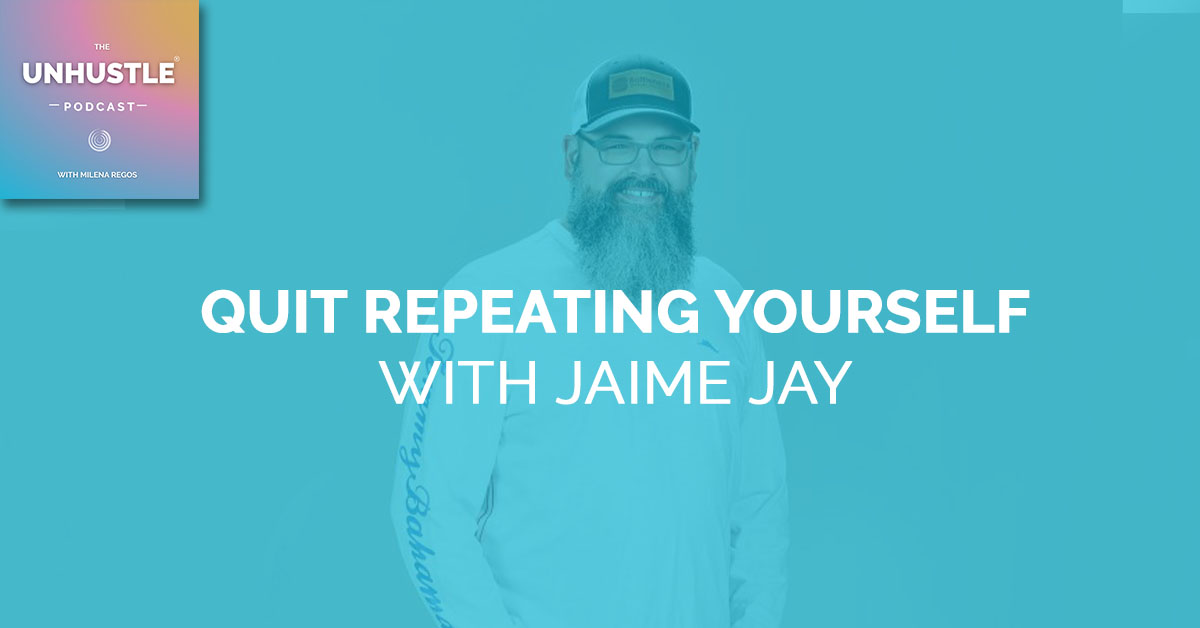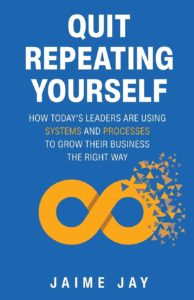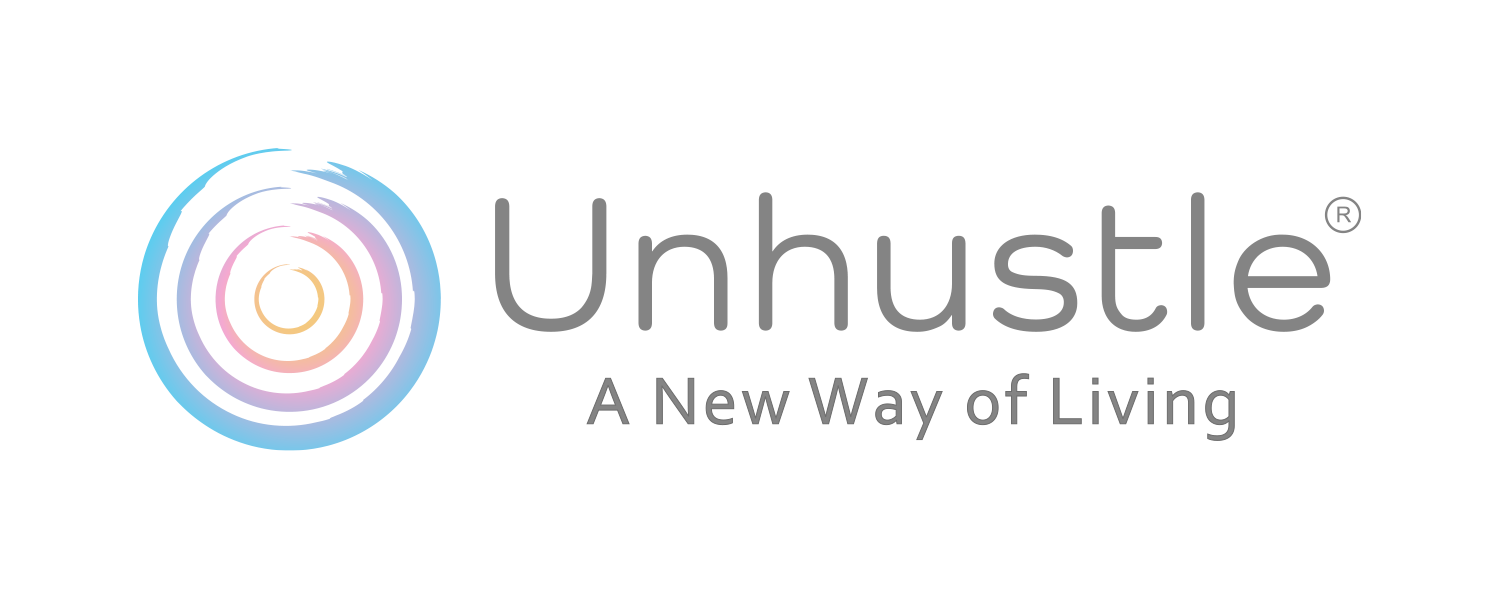

No one wants to keep reinventing the wheel, especially in business. Today’s guest is Jaime Jay, the Owner of Bottleneck Distant Assistants and author of Quit Repeating Yourself: How Today’s Leaders Are Using Systems and Processes to Grow Their Business The Right Way. In this episode, Jaime joins Milena Regos to chat about his book and share insights and tips for leaders on how to optimize their processes. It can start with something as basic as having your email set up for maximum efficiency. Tune in for useful, actionable tips to get your business moving with the right processes and workflows.
—
Listen to the podcast here
Quit Repeating Yourself With Jaime Jay
How To Do Less So You Can Achieve More
On the show, I’m joined by Jamie Jay, a super fun guy, the Founder of Bottleneck Distant Assistants. He basically helps people quit repeating themselves so that they can have more time to live. That’s the title of his book Quit Repeating Yourself. I love what he has to share. It’s very applicable nowadays for how to stop repeating ourselves every day so we can have more time for living. Here’s Jamie.
—
We are on with Jamie Jay from Bottleneck Distant Assistants. Jamie, you are my hero these days because you published your book and I got it in the mail. I have been reading it online on my Kindle, but now I have it in my hands. I wanted to ask you a few questions. I know you want to go play hockey and as every unhustle business owner, that’s your absolute right and priority. We’ll keep it short, succinct and concise. How was it writing the book?
It was tough. Thank you so much for having me on. It is a priority. I have to get out there on the ice and skate a little bit because the best thing about skating out there is I don’t think about anything else except being on the ice. Going back to the book. If I wasn’t passionate about it, I think I would have quit a couple of times. I’m not wired to write. It was tough, but I had a nice support system that supported me and kept me on track. At one point, I almost decided to say, “Let’s extend the deadline so I could come out in December with the book.” I talked to the publisher and I said, “I’m going to do this. I’m going to push through.” I’m glad I did because it feels wonderful to have an actual book out there, like, “Author? Who would have thought?”
Congratulations. It’s super exciting. I’ve been reading your stories and especially at the beginning of the book, you open up with a very heartwarming personal story and how you ended up going from the military experience. Tell me the whole story. How did you decide to come up with and build Bottleneck Assistants? Why are you so passionate about it?
Everything that we do in life is important, even the challenging parts. The good parts are fun to talk about, but the challenging parts, maybe not so much. The parts where we failed miserably are hard. You don’t want to talk to someone and say, “I’m a terrible person. I did this.” People are like, “You want to talk about good things in your life.” That’s why people like movies so much or things like that because they are always seeing the best. It’s super challenging, but they end up together in the end. They go off and live forever happiness. I think life tends to throw us a couple of surprises every night. It’s continual.
This is what’s beautiful. Every single person is unique in their own way because they have experienced their life. No one else has experienced their life only they have. There’s a specific name for the genre. It’s called Creative Nonfiction. Nonfiction because it’s true, but creative because I try to get a little storytelling to go along with some of my own personal experiences to where other people might be able to draw a parallel and experience. I have been homeless a couple of times, which I am definitely not proud of
Everything we do in life is really important, even the challenging parts.
A couple of times when I was younger, that wasn’t my fault and a time when I was older, that was 100% my fault when we were younger as teenagers and even a little bit younger than that. At the time, my dad that adopted me made some questionable business decisions. We found ourselves living in a truck at one point. I had my sixteenth birthday at a place on Harbor Boulevard in Anaheim, California, called The Pitcairn Motel, which was druggies and hookers. My little brother was 14, our 2 poodles and 4 bags of luggage were in a 1979 brown Chevy Suburban.
I walked about 1.5-mile up the road on Harbor Boulevard and I got a job at what was then the largest McDonald’s in the entire world, right across from Disneyland. I had my brown McDonald’s uniform on, and I was very proud that I was able to support us because twice a week, I was able to afford The Pitcairn Motel, where we could at least go in and shower and things like that.
My mom would drive around with my little brother and they’d order a twenty-piece chicken McNugget. I’m not proud because this is theft, but I would stack as many nuggets in there as I possibly could because that’s how he ate. I would see all of the burgers and everything that, in a certain amount of time, we couldn’t keep, so we’d have to throw them out. McDonald’s didn’t want to be liable for any bad food or anything.
Do you stock them in your pockets?
We weren’t allowed to. We would have to take me to the trash, but I took him to the trash you. What I ended up doing was we’d take a couple, but there was a bunch of homeless people. I would take these to all these homeless people. They were going to throw them out and I stashed them somewhere. When I left, I could go grab it and not get caught. I helped all these other people out. Even back then, I was always wanting to try to do something good for people. Still to this day, the guilt follows me around a little bit that I was a thief.
You call that a thief.
They paid money for this stuff.
McDonald’s can afford it. We should get McDonald’s to sponsor this show.
All of those things shaped me into where I am now.
Fast forward, you decided in 2016 to start a company, which your point of view and mission are assisting business leaders to stop working on the wrong things so they can focus on doing the best work. Let’s uncover this a little bit. What do you mean by that?
Many of us, you, me, find ourselves doing things in our own business that we shouldn’t be doing.
Very frustrating as you and I have been talking.
It can be overwhelming. I used to spend about 90 minutes a day on email. True story. The average person executive spends on email is about three hours a day. I spent about 90 and I thought that was terrible. Now I spend about 5 or 10 minutes a day.
How did you do it? I was talking to somebody else, including me. How do I get myself out of my inbox?
I’m a huge zero-inbox freak. There is a method to the madness. What I was able to do by reducing 90 to 10 minutes a day, do you realize that equates to two and a half months a year?
You can write a whole book in there. When we talk about systems and processes, which you talk a lot about in your book, there are two things I want to draw into, emails and meetings.
First and foremost, in order for you to be able to delegate out of your inbox, you have to have the confidence that whomever you are delegating that too is you’re going to be able to trust them. They’re going to be able to do anything up to your level of expectation. How do you do this? You start off first. For me, I get offers or opportunities quite a bit to go appear on a podcast. What are people normally need when they go on a podcast? They need a headshot, bio, written overview or maybe some links to our stuff or whatever that may be.
What I did is I kept finding myself writing this over and over again. I took a cheat sheet that we have. I put whenever somebody inquires about me being on their show and we accepted, “Here’s my canned response. Here are the attachments to that response.” This is in my instructions, “I put little carrots around the areas that need to be personalized.” It’s maybe a name, maybe something having to do with their show or something like that. Every time I do something like that, I create another task or another, “Here’s the copy-paste.” What’s cool too is for these, from my attorney, I’ll put the email down or if it’s my mom, this or whatever, “Don’t reply to those, put them into this.”


What’s cool is if you use G Suite services, which I highly recommend doing that regular free Gmail, because you can get hacked pretty easily, go to G Suite and spend $6 a month or whatever it is. There are some features that you can put into your Google G Suite. I use three different ones. I work in one and if she puts a little exclamation point, that means it’s something that I need to pay attention to. It goes into a certain section just for me. If I look at something and I say, ‘I don’t want to do that. I want Reyna to do that,” I clicked that little thing for a little another icon. It goes in for Reyna to do that. On mine, as soon as I finish it, I click finish, which is the third icon. We have three different little icons.
That way, Reyna can see everything that’s done. If I send something to her, I know she’s working on it. She doesn’t have to question which ones I have to do, she has to do or done. It’s all built out there. We have an inbox cheat sheet. If anybody wants that, I’m happy to share that with anybody. It’s super easy to set up. We even have examples in there on, “If you’re going to do it from this email. What happens with this email. If there’s a customer complaint, what do you do?” We have all of that built-in. The nice thing is we can continually add to that as we grow or change.
When you talk about systems, processes and workflows, that’s the process that you go through. It’s not just emails, but what else can you apply these to?
Calendar management. I have nine different people in our company that have calendars. In order to, “How do we manage all those?” We have a process, “This is how you set up your calendar. Step. Once you set up your calendar, how do you share the link? This is how you share the link. Step.” We do that because if we bring somebody new on, we don’t want to have to take up the time of somebody else explaining how to set up all of that stuff. We say, “Here you go. This is how you set up your calendar. This is how your user calendar. This is how you invite other people to schedule on your calendar.” It’s super simple.
In the beginning, did it take some time? Of course, it took some time to set that up, but now if someone comes on, within 5 to 10 minutes, they will be able to set up their calendar, invite somebody on and share their calendar link out. It’s super easy. Think of it like this. When you build a house, it takes a long time. You put the foundation. You have got the walls, the framing and ceiling. There’s a lot of stuff that goes into building that house. The cool part is, though, as you go, you need maintenance. Maybe someone punches a hole in the wall or something falls over. It’s easier to patch that hole in the wall than it is to build a new wall.
That’s why it’s important to spend that time on building the foundation for your business so that as you grow and discover different friction points or maybe some points of, “This isn’t working,” you don’t have to build the whole wall. You have to tweak the process a little bit. I always say, “Workflows, systems and processes are living, breathing aspects of your business.” In this way. You always have to continue breathing.
To stay alive, we have to continue breathing. It’s the same thing with your business. For your business to breathe, you constantly have to be mindful of it and listen to the feedback you are getting from your team and/or from your vendors or clients. When they are having challenges, it’s an easy fix now. It’s something you can identify right away and take care of. You don’t have to spend months trying to figure out you got to buy a whole new brand new software, “I got to do this.” It’s super easy.
It sounds like you talk a lot about trust, building the culture, and surrounding yourself with people who can support you and grow your business. What advice do you have for building positive work culture?
I am a huge fan of Peter Drucker. I love good positive culture. I’m massively a huge fan of your Unhustle Movement. I think it’s fantastic because it’s amazing how much more you can get done with unhustle mindset than, You got to do this.” You are going and working 20 or 25 hours a day in 366 days a year. It’s crazy that way. Your Unhustle Movement is a great example. Look at all the people that are surrounding who are overwhelmed. They’re getting burnt out. They are finding things. It is too much and they don’t know where to go. When they talked to Milena and they get this whole thing about Unhustle, they are like, “it’s okay that I put my phone down or I go on a hike.” Give yourself permission to chill out.
The reason why it’s important for you to understand exactly where it is you want to get to is because other people are going to latch onto what you believe.
This all has to do with culture. I love the fact that you have this kind of culture. The biggest part about culture for me starts from the interview and going up. It starts from the foundation. It’s important for us to believe in whatever it is we aspire to do. People call this vision, “Where do you want to get to? Where does Milena want to get to? What personally do you want to be able to do in your life?” The mission and the daily objective are to get you to whatever you aspire to be. The reason why it’s so important from Milena, for you to understand exactly where it is you want to get to the Unhustle Movement or whatever that may be is because other people are going to latch onto what you believe.
If they believe in that same vision and mission, you can help them achieve what they want to achieve. Now, all of a sudden, you are getting similar belief systems. That supports a positive culture. That is huge. Once you have your foundation set, one cool way of doing this is during an interview process, or it could be a vendor or anything. I love this question. If somebody is going to come on board here, the last question I ask them in the interview is, “What do you want to do when you leave Bottleneck? What do you want to do when you leave Unhustle?” “I love it.” “No. What do you want to do? What’s the next step in your life? What’s your life goal?”
From that answer, you are going to get three things. Number one, they are going to have a lot of confidence and a lot of like, “They want to know what I care about.” What that does is do two things for whomever the hiring person is. Number one, it gives you an opportunity to say, “I’ll be the first person to help you out. We had somebody that wanted to play the violin. That was her goal. We can’t build a position for a violin, but I was the first person to endorse her to write her a letter of recommendation. Now she plays violin for Manila Symphony.”
The other thing is if they say, “I’d like to own my own business. I’d like to do something,” there might be a way that we could create a role within Bottleneck where they’ll stay here for a long time. It’s a great question to ask, plus it lets them know that they have a voice. Those are the people that we want to attract. The people that we don’t hire are the people that say, “I want to work at Bottleneck.” “What you want to know?” “I love recruiting.” You want to try and get them to where they open up. That’s a cool question that will help somebody align with the culture or, maybe, more importantly, have not aligned with the culture.
Basically, you are incorporating a culture of care?
Leading with kindness.
It’s what’s I call human-centered culture instead of hustle culture. You are my hero. Excellent, Jamie. Good job.
The other thing too is we have a word for every year. Kindness Illuminates Natural Decency with neoteric. Meaning, new or modern. KIND neoteric energy with selfless statements. Every year we come up with a word a year like we have had LISTEN Listen Intensely and Soulfully To Engage Notably. We have had FOCUSS, Finding Opportunities by Creating Uninterrupted Strategy Sessions. The reason why we focus on these different words of the year is because everybody on the team does. It’s a nice reminder that whole year so that as we move forward to the next year and come up with a new word, which I’ll be launching in January 2022, we’ve practiced this. It’s become a habit. We are very intentional about those words of the year. It goes back to positive company culture.
Do you want to tell me what the word 2022 is?
No, because I don’t even know it yet. I’ve got three that I’m getting down to, but we don’t know yet.
The book is available for purchase and how’s it going so far?
We got ranked 26th on Amazon. I’m happy about that. I’m shy of 500 copies. I literally started marking it.


Anyone who wants to quit repeating themselves and focus on the work that matters should read this book. I’m super excited to finish mine and, more importantly, implement everything that you and I are trying to build with Unhustle so that I have the mindset, but like a lot of people, I’m not 100% there. I don’t have that many meetings, but I do spend a lot of time in my inbox. I need to get myself out of my inbox. Anything that I didn’t ask you before you go and play hockey?
What’s next for Unhustle is what I’d like to know.
It is building a business where I can fire myself from and launching a program called Unhustle Mastery. It’s an eight-week program for business leaders and executives who want to quit the cult of busyness, burnout and welcome more wellbeing, freedom and high performance in their days. That’s coming up in October 2021 in the Unhustle Community. This is an ongoing effort. We have people from fifteen countries in it. I want to plan some fun things in there ongoing and a lot of exciting things. I’m working on the book.
Thanks for creating this Unhustle movement. It’s fantastic, super important and super needed. You’re going to affect so many people in a positive way. It’s amazing.
What keeps me going every day is knowing that kind of feedback from people. I appreciate it. All of us, business owners and leaders, like to know that we are making an impact and our purpose matters to other people like you are trying to help other people go pause that overwhelms, all the stress and work mentality. We’ll do it together. I’m excited to do it with you. Thank you so much, Jamie. You have been fantastic. Enjoy your hockey game and have a great weekend.
Thank you.
—
I hope you enjoyed this conversation with Jamie Jay, the author of Quit Repeating Yourself. You can get the book on Amazon, learn how to stop working on the wrong things, and start working on the things you are good at. You can connect with Jamie at Bottleneck.online. You’d want to check out what he’s doing over there if you need some assistance or somebody to fire you from your inbox and delegate all the tasks that put you in that zone of not being good at that frustrating, overwhelming and over-stressing you. Thank you so much for connecting with us and reading this interview with Jamie Jay. I’ll see you soon.
Important Links:
- Bottleneck Distant Assistants
- Quit Repeating Yourself.
- Kindle – Quit Repeating Yourself: How Today’s Leaders Are Using Systems And Processes To Grow Their Business The Right Way
- Unhustle Movement
- Unhustle Mastery
- Unhustle Community
About Jaime Jay


